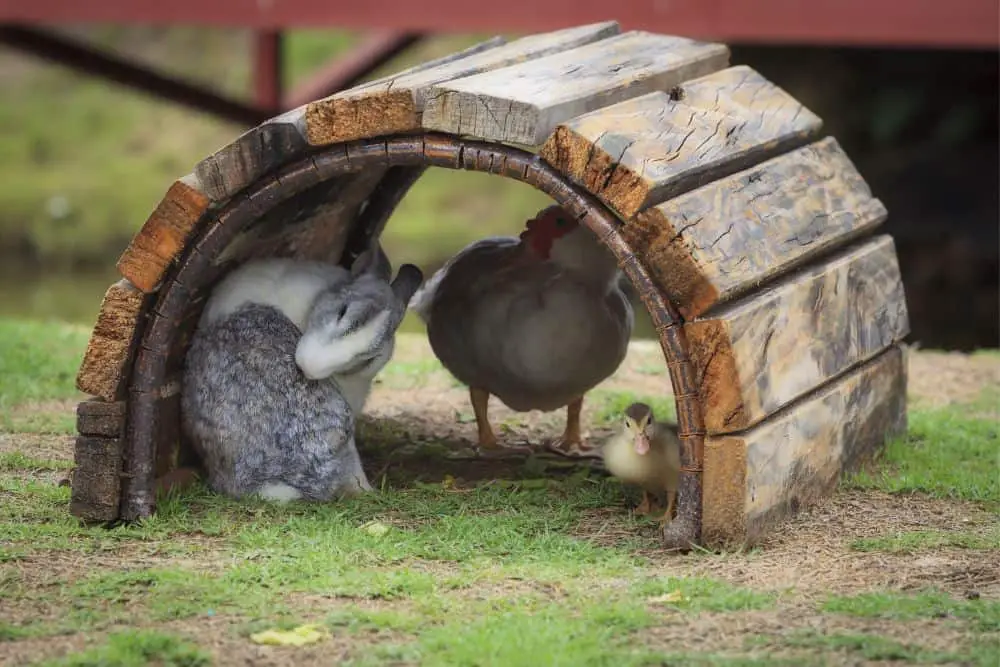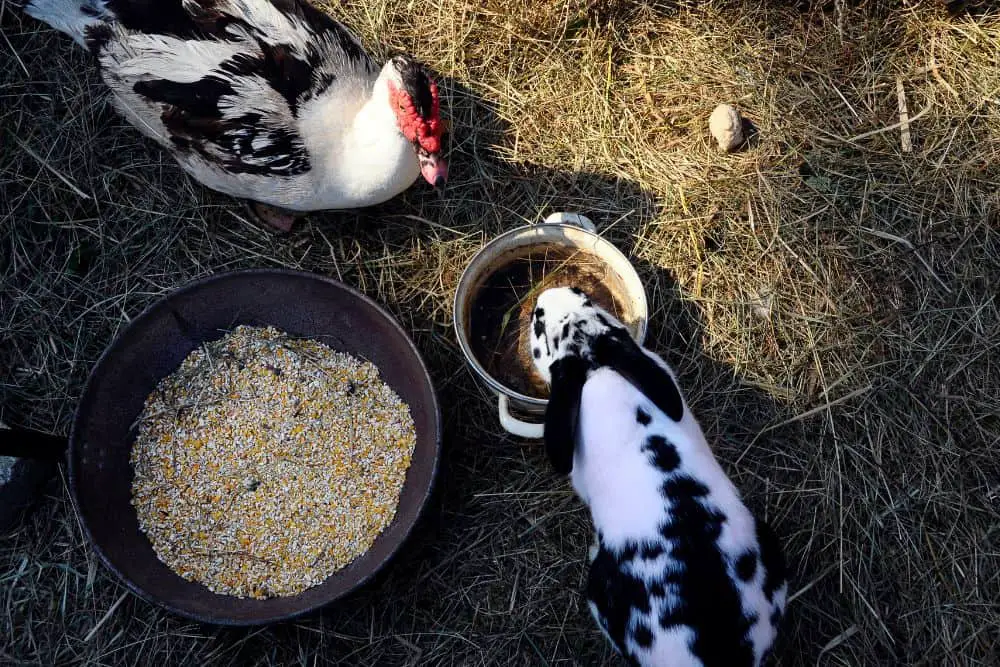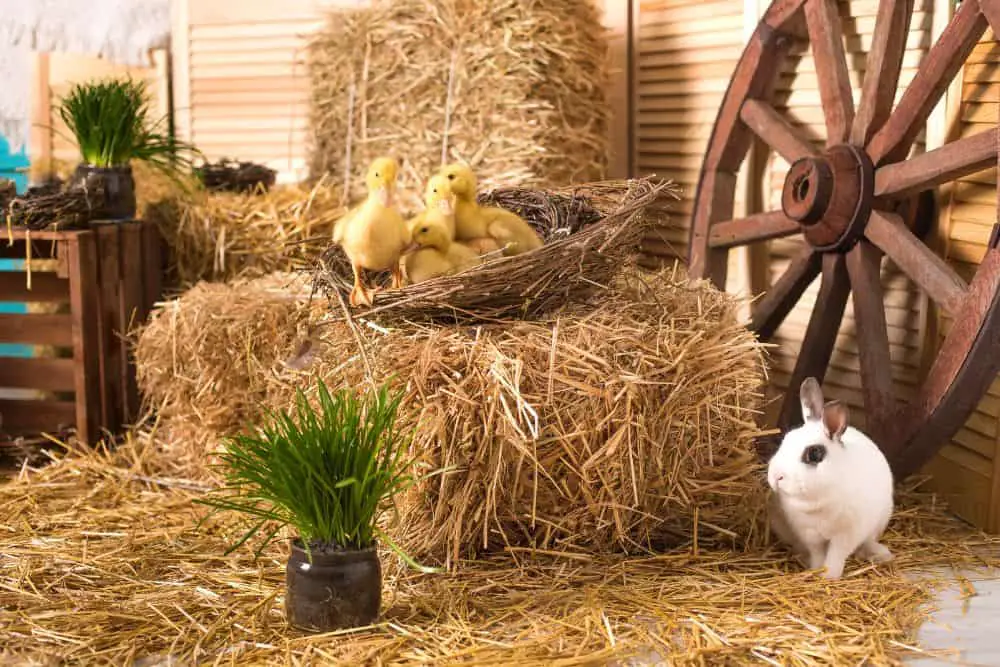A question that many people ask is whether rabbits and ducks can live together. The answer to this question is not as simple as a yes or no. Both rabbits and ducks have different needs and behaviors that need to be considered before deciding if they can live together.
Rabbits are social animals and do best when they live in pairs or small groups. They are also timid by nature and can easily become alarmed, which can lead to them injuring themselves. Ducks, on the other hand, are not as social and do not mind being alone. They are also very curious and active, which can sometimes result in them disturbing the peace of a quiet home.
Behavioral differences aside, rabbits and ducks also have different nutritional needs. Rabbits require a diet that is high in fiber, while ducks need a diet that is higher in protein. This means that they would need to eat different foods if they were to live together.
So, while rabbits and ducks can technically live together, it is important to consider all of the factors before making the decision to do so.

Why Ducks and Rabbits Aren’t the Perfect Pair
On the surface, ducks and rabbits seem like they would make the perfect pair. They’re both cute, cuddly, and relatively easy to care for. However, there are a few important reasons why these two animals shouldn’t be kept together.
Duck Traits and Facts
As anyone who has ever been to a park or pond knows, ducks are a common sight. These waterfowl are found in both saltwater and freshwater habitats all over the world. While there are many different species of ducks, there are 12 that are considered to be common. The most distinguishing factor between different types of ducks is their feeding habits.
There are two types of ducks based on how they acquire their food: diving and dabbling ducks. Divers will submerge themselves and dive for their food, whereas dabblers will acquire their food just beneath the surface of the water. In addition, ducks are also classified by their plumage. Some ducks have brightly colored plumage, while others are more drab. The functions of plumage vary from species to species, but it is generally used for camouflage or to attract mates.
Ducks are also unique in that they have webbed feet, which help them to swim and walk on soft surfaces like mud and marshland. Their feathers are also waterproof, which helps to keep them warm and dry.
Rabbit Traits and Facts
Rabbits are relatively small mammals found in a variety of habitats all over the world. American Rabbit Breeders Society recognizes 49 rabbit breeds, which are classified based on their physical characteristics. For example, some rabbits have short fur while others have long, fluffy coats.
Rabbits are herbivores and live on an entirely plant-based diet. In the wild, they are mostly active at dawn and dusk and spend most of their time feeding and lounging in their burrows.
Thanks to their gentle nature and cute appearance, rabbits have become popular pets in recent years. Not all breeds are gentle and some are pretty good at scratching you. However, they are also a popular option as meat rabbits on hobby farms.
Health Risks of Keeping Ducks and Rabbits Together
Ducks and rabbits may seem like an unlikely pair, but in recent years, these two creatures have become increasingly popular as house pets. While ducks and rabbits can coexist peacefully, there are also some significant health risks to consider before keeping them together.
One of the biggest dangers of keeping ducks and rabbits together is the potential for disease transmission. Ducks produce a high amount of wet feces that can carry bacteria harmful to rabbits. When they are cohabitating in close quarters, this can become a significant concern.
In addition, if the ducks and rabbits are both fully domesticated and eat food you put down for them, they may compete for resources and miss out on important nutrients.
If you are considering keeping ducks and rabbits together, it is important to weigh the pros and cons carefully to ensure that you are providing a safe and healthy home for your pets.
Environmental Differences
Ducks and rabbits are two very different animals, and as such, they have different environmental needs. Ducks, for example, require a source of water in their habitat, whether it be a pond, lake, or river. This is because ducks are semi-aquatic creatures, and their bodies are specially adapted to life in the water.
Rabbits, on the other hand, are land animals through and through. While they can swim if they need to, it is not an activity that comes naturally to them. For rabbits, a source of water can actually be dangerous, as they are very susceptible to drowning.
When it comes to food, both ducks and rabbits are herbivores. However, their diets differ slightly in that rabbits tend to eat more vegetables while ducks eat more insects. All in all, these two animals have distinct environmental needs that must be taken into account in order to provide them with a healthy and safe home.
Characteristic Differences
Though they may seem similar at first glance, ducks and rabbits have several distinct differences. One obvious difference is their size; ducks are generally much larger than rabbits. Another difference is in their temperament; rabbits are typically quite high-strung and easily frightened, while ducks tend to be more calm and easygoing.
This difference is likely due to their position on the food chain; as prey animals, rabbits have evolved to be constantly on the lookout for predators, while ducks are less likely to be targeted by predators.
As a result, rabbits tend to be more high-strung and easily scared than ducks. This can make them more susceptible to stress and injury.
Overall, there are many different characteristics that distinguish ducks and rabbits from each other, making them two very different types of animals.

How to Introduce a Baby Rabbit to a Baby Duck
If you’re considering adding a baby rabbit to your family, you might also be thinking about getting a baby duck. After all, they’re both small, adorable animals that will bring lots of joy to your home. But before you introduce the two, there are a few things you need to keep in mind.
For starters, rabbits and ducks have different dietary needs. Rabbits require a diet rich in hay and vegetables or pellets, while ducks need a diet that includes plenty of water and protein. You’ll also need to make sure that the two animals have separate living quarters.
Baby rabbits are delicate creatures and can easily be injured by a playful duckling. Once they get a bit older, they will most likely need to be separated in their actual living arrangements. Their environments and health concerns remain the same, though.
So as long as you take these things into consideration, you should have no problem introducing a baby rabbit to a baby duck.
How To Keep Ducks And Bunnies Together
Introducing ducks and rabbits at a young age is the best way to try and get them to live together. If you have an older rabbit, it is generally not recommended to get a duck, as the older animal will likely see the duck as a predator.
There are differences in their needs, for example, ducks need a pond or large container of water that they can get into so they can immerse their heads and clean their eyes and nostrils. They also need a place to nest and lay their eggs. Rabbits need a hutch with bedding material and plenty of hay for eating. Both animals also need exercise space and hiding places.
As long as their needs are met, ducks and rabbits can live together without too much conflict. There may be some chasing and biting from the ducks directed towards the rabbits but if there is enough space, the rabbits should be able to escape easily.
The biggest danger to rabbits around ducks is getting stepped on or having their hutch knocked over, so it is important to provide plenty of space and supervision when they are together.
In Conslusion
Ducks and rabbits can live together, but it’s important to be aware of their differences. Make sure to provide each animal with its own living quarters, food, and water. If you aren’t colony raising your rabbits, make sure your ducks can’t get on top of your rabbit cage to avoid any injuries or the ducks pooping on top of your rabbits. With a little bit of care, ducks and rabbits can peacefully coexist.

